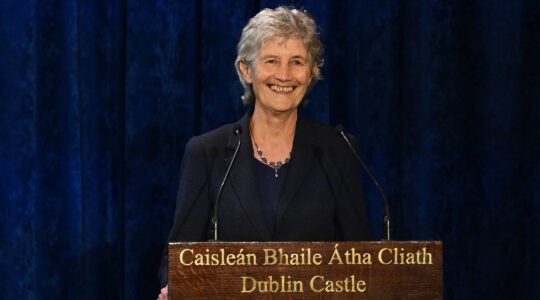
Finn Schwarz, president of the Jewish Congregation of Copenhagen, speaking in Copenhagen, 2011. (Natan Dammas / mosaiske.dk)
(JTA) — Untrained rabbis mutilating hysterical babies while black-clad men stand around praying: The description of a Jewish circumcision in the mainstream Danish media indicates the xenophobia creeping through Scandinavia, some Jewish leaders fear.
“Around the baby stand ten black-clad men – a must in every Jewish circumcision,” the text declares. “As usual in Judaism, women aren’t allowed to be present. An untrained rabbi mutilates the baby, who cries and bleeds profusely as the men pray.”
The words typify “the level of the current debate on circumcision in Denmark,” said Finn Schwarz, president of the Jewish Congregation of Copenhagen.
Schwarz says the false account of a Jewish circumcision indicates the increasing intolerance toward the ritual, couched in xenophobia. Buttressed in recent bans elsewhere in Europe, Schwarz worries that a Danish push could turn into parliamentary action on circumcision in Denmark as early as this year.
The false description belongs to Kjeld Koplev, a well-known Danish journalist who converted from Judaism to Christianity. He began telling the story to the media after a court in Cologne, Germany, ruled in June that the non-medical circumcision of a minor amounted to a criminal act. Koplev’s account of how ritual circumcision is child torture and abuse appeared on television and in an Op-Ed in the newspaper Politikien.
“When a former Jew says this, people listen,” a frustrated Schwarz told JTA.
His community has published a 20-page defense of circumcision as it prepares for a protracted rearguard battle. Beyond medical aspects, it attempts to explain why circumcision — the first biblical covenant between man and God — is central to Jewish life.
Although Scandinavian societies and governments have led opposition to circumcision long before June’s ruling in Cologne, the debate has taken “a nasty turn” since the German court’s ruling, Schwarz says.
Several politicians in Denmark, Norway and Finland said this summer that they were in favor of banning circumcision. Yet no party has submitted a bill to restrict the ritual.
Hostile media are the least of the concerns of Scandinavian circumcision advocates. In 2003, Denmark’s Children’s Ombudsman, a government body, classified circumcision as a children’s rights violation. Its Norwegian counterpart concurs. And Finland’s Child Welfare Union lists circumcision as “violence.”
Schwarz worries that Copenhagen may set a precedent.
“Yes, I think we will see a bill to ban circumcision from one of Denmark’s radical left parties,” he said, adding that the outcome of such a vote is anyone’s guess.
Sophie Lohde, speaker of Venstre, Denmark’s largest party, supports a ban, as do speakers of other parties, according to the newspaper Kristeligt Dagbold. Yet JTA contacted all of Denmark’s parties in the legislature and not one indicated that they were ready to support a ban.
Laura Glavind, a spokeswoman for the liberal party Venstre, told JTA that the party did “not have enough knowledge” and would take a stand after consulting the Health Ministry.
Detractors of circumcision rely on a survey published in 2008 by the Danish Health Ministry’s research institute, SSI. The study, conducted by Dr. Morten Frisch, indicated that circumcisions caused sexual performance problems.
The research, which resurfaced last month in media debates about circumcision, included 125 circumcised men. Two were Jewish, five were Muslim and the rest were circumcised for reasons beyond their religious community’s beliefs.
Dr. Ilan Raymond, a physician from Copenhagen and a member of the Jewish community’s board, hopes that talk of parliamentary action is a byproduct of what’s known as “the silly season.” During the slow summer months, journalists and backbench politicians often resort to statements about circumcision to stay relevant, says Raymond.
If a ban does come to pass, Danish Jews would “pack up [their] suitcases right away and end 400 years of Jewish life in Denmark,” Bent Lexner, Denmark’s chief rabbi, said in a recent filmed interview for a local news station.
Regardless, merely following the acrimonious debate on circumcision is painful for Danish Jews, a community of roughly 8,500.
“It deeply saddens me,” Schwarz said. “For centuries we’ve been a very important factor and have done a lot for this society. Yet now we hear our customs are barbaric and that we need to evolve.”
Some anti-immigration campaigners are using the circumcision issue to prevent what they call Denmark’s “Islamization,” Schwarz adds. A nation of 5.5 million, Denmark has approximately 210,000 Muslims, according to the U.S. State Department.
He believes that some right-wing Danish politicians do not raise the subject to avoid being seen as targeting Jews.
“If not for the Jewish community, circumcision would’ve already been banned here,” Schwarz said.
Danish Muslims, Schwarz says, are happy to let Jews lead the defense. Whereas Jews circumcise boys when they are eight days old, many Muslims are circumcised much older in childhood — some as late as puberty, and most before the age of 10.
“The Jewish circumcision looks much more peaceful,” Schwarz said. “The Muslims have a bigger problem in the debate than us Jews.”
In Sweden, the debate on circumcision is in clear reaction to the arrival of Muslim immigrants, says Lena Posner-Korosi, president of the Council of Swedish Jewish Communities.
The debate, however, is of little concern to Sweden’s approximately 20,000 Jews. In 2001, the community lobbied successfully for special legislation on circumcision of male babies younger than two months.
The law says that circumcision of newborns may be performed by a “licensed professional.” The country’s Jewish ritual circumcisers, or mohelim, receive their license from the country’s health board, but a nurse or doctor must still be present when they perform the procedure.
“It’s not a bad compromise and we had to fight hard to get it,” Posner-Korosi said.
Children older than two months, however, must be circumcised in a hospital and by a doctor. In February, the Swedish Paediatric Society called for a ban on circumcision, but government officials clarified that the law would remain.
Norwegian Jews, who number around 700, last year formulated a similar compromise with their government, but it has not yet been enacted. Ervin Kohn, president of the Jewish Community in Oslo, expects no ban there in the near future.
Finland’s Jewish community of approximately 1,400 has little to fear either, according to Gideon Bolotowsky, president of the country’s Central Council of Jewish Communities. This summer, some lawmakers from the Green Party failed to secure support within their own faction for a draft bill on circumcision.
Bolotowsky and Kohn of Norway both say that the German government’s actions after the June 25 ruling in Cologne have “discouraged” those seeking a ban in Scandinavia. Less than a month after the ruling, the German parliament passed a resolution in favor of allowing circumcision. The government is expected to draft legislation this year to protect the custom.
Backpedaling can be observed elsewhere in Europe. A Swiss hospital that had imposed a moratorium on circumcisions ended it this month. Last month, an Austrian court ruled in favor of allowing circumcisions, ending a brief ban in some state-run hospitals.
Raymond, the physician from Copenhagen, believes that even if attempts to ban “foreign” religious rituals persist, they are a passing phase.
“Trying to resist change is natural but futile,” he said. “Scandinavia will eventually come to terms with its different populations simply because the world has changed.”
JTA has documented Jewish history in real-time for over a century. Keep our journalism strong by joining us in supporting independent, award-winning reporting.





